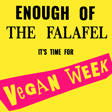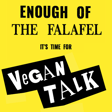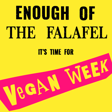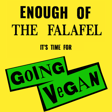
187- Amazon Prime Video launches undercover animal experimentation lab exposé
It's in Spanish, so Ant, Carlos, Julie & Paul don't know what they're saying, but thanks to the incredible feat of going undercover in an animal lab for TWO YEARS, Infiltrada en el Búnker (Undercover Inside the Bunker) is now available to stream on Prime Video.
We also look at nine other stories from the vegan & animal rights space from the last week or so.
****************
Enough of the Falafel is a community of people who love keeping on top of the latest news in the world of veganism & animal rights. With the Vegan Week podcast, we aim to keep listeners (& ourselves) informed & up-to-date with the latest developments that affect vegans & non-human animals; giving insight, whilst staying balanced; remaining true to our vegan ethics, whilst constantly seeking to grow & develop.
Each week we look through news stories from the past 7 days in the world of veganism & animal rights.
If you spot any news stories that might catch our fancy, or have an idea for a discussion topic, get in touch via enoughofthefalafel@gmail.com.
*******************
This week's stories:
https://jerseyeveningpost.com/news/2025/07/02/jersey-move-to-allow-charter-fishing-for-bluefin-tuna-criticised-by-uk-animal-rights-group/
https://www.farminguk.com/news/rspca-assured-unveils-stricter-poultry-welfare-rules-for-2025_66818.html
https://www.independent.co.uk/news/science/vegan-diet-mediterranean-weight-loss-diet-inflammation-b2778007.html
https://www.scotsman.com/lifestyle/food-and-drink/burger-king-is-giving-away-free-vegan-burgers-to-meat-lovers-to-show-them-how-tasty-they-are-5201538
https://www.c21media.net/news/prime-video-launches-covertly-filmed-doc-on-animal-cruelty-at-spanish-lab/#
https://www.youtube.com/watch?v=1m5vqNPLekg
https://www.huntsabs.org.uk/one-less-hare-hunt-as-south-west-beagle-packs-merge/
https://www.countryside-alliance.org/news-content-type/animal-rights-activists-sentenced-over-dairy-blockade
https://www.bbc.co.uk/news/articles/cwyrnlj5632o
https://www.newscientist.com/article/2486509-vegan-cheese-could-be-about-to-get-a-lot-closer-to-the-real-thing/
https://www.theanimalreader.com/2025/06/27/mexico-votes-to-stop-dolphin-and-umarine-animal-shows/
****************
Thanks everyone for listening; give us a rating and drop us a message to say "hi"; it'll make our day!
Carlos, Julie, Paul & Ant



